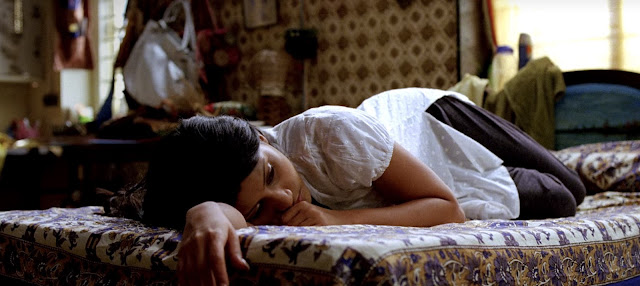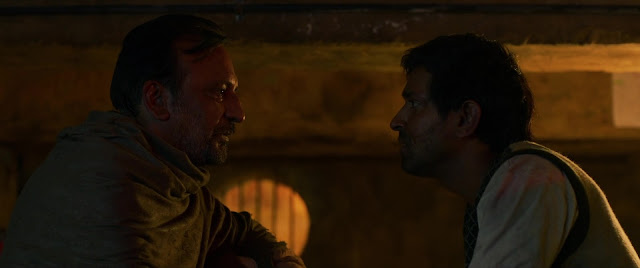In 12th Fail, Vidhu Vinod Chopra tells the real-life story of Manoj Kumar Sharma (Vikrant Massey), who overcomes extreme hardships to become an Indian Police Service (IPS) officer. The film is based on the 2019 eponymous non-fiction book by Anurag Pathak. 12th Fail has received much love since its release. I was unsure how the film would turn out, but I was surprised. It has been quite a while since I experienced emotional catharsis while watching a Hindi film, but 12th Fail is so poignant that by the end of it, I don't think it is possible to remain unaffected by it. I was immensely moved by its honesty. Much has already been written about it, but I still wanted to write about the different aspects of the film, which not only has an uplifting story but is also beautifully made.
The Kindness of People
There is a lot of brutality in the world of Manoj. However, at the same time, enough kind people helped him—a complete stranger—reach his goal. Be it the police inspector Dushyant Singh (Priyanshu Chatterjee) who comes to rescue him in the middle of the night, the restaurant owner who offers him a free meal, Pandey (Anant V Joshi) who takes him to Delhi, or Gauri Bhaiya (Anshumaan Pushkar) who offers him coaching and guidance and all sorts of other help. Manoj is indebted to all of them and will remember them all his life. Gauri Bhaiya joked that Manoj should return twice the amount he had loaned him when he becomes an officer. When Pandey is in jail, Manoj is the only one who comes to help him. When Manoj had his final interview, he first went to Pandey to meet him even though they were not talking because of a fight. After Manoj becomes a police officer, he gives the first card of his wedding to Dushyant. He is following Shah Rukh Khan's advice in Luck By Chance—to never forget those who knew you when you were a nobody.
Cheating and Honesty
The film opens with Manoj preparing chits for cheating. Manoj believed that honesty was a useless principle and no good comes of it. His interaction with Dushyant changes his belief, and he takes his advice to give up cheating as the gospel truth. He stopped cheating in his exams and everything else in life. He also started following in his father's footsteps to become an honest man. Manoj seems to have shades of the heroes from Satyakaam and Newton, where, like them, he is sometimes arrogant about his honesty. At places, Manoj reminded me of the principled Amol from Chhapaak, also played by Vikrant Massey.
Privilege
One of the central themes of 12th Fail is the notion of privilege. It makes the point that it is tough for someone not born with a silver spoon to make it in life. They have to work harder to reach the top, and their victories are more difficult than those who win the lottery of birth. The struggles of the underprivileged are harder than those of the privileged. Only a handful of students from the Hindi medium clear the final round. So, when someone from such a background makes it, they deserve it more. Manoj cites the example of Edmund Hillary, who climbed Mount Everest, where he says there was a sherpa with him who climbed without oxygen. The sherpa has had to work harder to reach there. In his case, he ran the race without oxygen and nange pair.
The film mentions more aspects of privilege that can bestow certain other advantages. In the interview, Manoj is asked to prove if he would fit in with the officer culture, given his background in Hindi medium. He uses water to make his point. He asks for water in a steel glass, perplexing the interviewer, who says water remains the same in whatever container. Manoj makes the precise point that language is only a medium, so he can succeed there as well. As the teacher also explained, the technology in propulsion remains the same, whether it is a large satellite or a tiny cracker rocket.
Power
The film advocates that power in the hands of the right can bring metamorphosis in social and political aspects. Manoj's first brush with politics is in his village, where the local politician won't let him drive his vehicle. During his interview, he cited the same instance where he would not allow such things to happen if he were made an officer. After meeting with Dushyant, he realized that power in the hands of an honest person can change the world. Shraddha (Medha Shankar) also mentions that she wants to become an officer because she wants the power to stop injustice in the world. In this aspect, a few mentions of APJ Abdul Kalam and B.R. Ambedkar are present in the film. In the cleverly-shot scene, the film also shows a photograph of Swami Vivekananda.
Restart
In the film's opening moments, Manoj's father recites a few words from Atal Bihari Vajpayee's poem Geet Naya Gaata Hoon. He says, "Haar nahi manunga, raar nayi thanunga." I will not concede defeat; I will start the struggle afresh. This essentially surmises the life story of Manoj. He does not give up. Even if he fails, he restarts from scratch. Gauri Bhaiya uses the example of snakes and ladders to underscore the same point. Life is a game of constant snakes and ladders; if one falls back to the beginning, one must restart. Gauri's Bhaiya shop is aptly named Restart.
Sight and Sound
12th Fail has much to see. Early in the film, Dushyant is offered a bribe by the school principal for allowing students to cheat. Manoj and the other students gathered outside and watched from behind the iron bars in the window. Later, the viewpoint of being behind bars is repeated when the police arrest Manoj and his brother for jugaad. Then, when Manoj loses his luggage in Gwalior, he looks at the food shop from a similar viewpoint. In the end, when the results were announced, we again saw that students were standing behind bars. This is befitting of the film's theme of crossing these barriers from one world to another world. The other side lies in power, and Manoj has reached that side with his immense grit.
The other noteworthy thing about 12th Fail is its fantastic use of sound. The film opens in Chambal, with some dramatic sounds playing at the introduction. The background music is lovely, which, Vidhu Vinod Chopra has clarified in an interview, is inspired by Satyajit Ray's Pather Panchali. When Manoj loses his bag in Gwalior, he seems disoriented, and all the crackers start bursting, downing everything out. This instance is repeated before his interview, where he becomes lost in the din of thought, and the sounds of his mind drown everything out.
The Light Within
After Manoj leaves the library, he starts working and living in a flour mill. The space there is so constricted that he cannot even stand erect. Shraddha visits him and questions how he will study in all the darkness. A smiling Manoj replies that his father used to say, "Baahar ke andhere se nahi, andar ke andhere se daro. Suvidhaayon ke laalach me samjhauton ka andhera." Do not fear the darkness outside; fear the darkness within. One has to deal with the darkness of compromises for different comforts. He says he is not afraid of the darkness of the outside world. Perhaps that is why he is always seen around light bulbs throughout the film. The shiny aura of the light outside complements the light within him. During his final interview, he is asked what he would do if he did not become a police officer. He says that once studying under a street lamp, he learned, "If I cannot be the sun that lights up the earth, if I cannot be the sun that shines upon the earth, I can still be a lamp and light up my street." He compares himself to the lamp, where he is happy to shine light upon a few students and teach them. Even in the interview room, we can see the lamps in the frame when he walks out.

History Repeats
The narrative in the film repeats an earlier moment in some places. Early on, Manoj runs to Dushyant to ask for help when his brother is arrested by the police. He exhorts him to help him immediately. Later, the situation comes back twice in different forms. First, when Manoj clears the prelims, he runs to Deep Mohan (Sam Mohan) to ask for help as he owes him. Second, Manoj helped his friend Pandey when the police arrested him without due process. It is almost the reverse of the earlier situation, where he becomes the rescuer instead of the one being rescued.
Manoj's father, Ramveer Sharma (Harish Khanna), was also a principled man. He refused to engage in corrupt practices, which caused his bosses to let him go. His father was suspended from his job as he refused to be complicit in a scam. In an altercation, he throws his slippers at the boss before storming out. Later, Manoj had a similar interaction where he, too, threw his slippers at the librarian who accused him of cheating.
Pandey
12th Fail is narrated by Pandey. In many places, Pandey's words and actions are reminiscent of Farhan Qureshi's (R. Madhavan's) from 3 Idiots, also produced by Vidhu Vinod Chopra. Pandey wants to be in the media, but, like Farhan, he does not have the courage to tell his father. In choosing him as the narrator, the film also gives him a chance to make his dream of telling stories come true. Sometimes, Pandey's words reminded me of the line in 3 Idiots where they said, "Dost fail ho jaye toh dukh hota hai, lekin dost first aa jaye toh zyada dukh hota hai."
Parents
The film's most moving scenes are Manoj's conversation with his parents. Two scenes appear back to back—one with his mother and one with his father—where he becomes more mature. When he visits home, his mother, Pushpa (Geeta Aggarwal Sharma), tries to portray that everything is fine even though she is struggling to make ends meet. Manoj is intuitive enough to see her lying, and he confronts her. And then, Manoj's father visits him in Delhi. He breaks down seeing Manoj's deplorable living conditions and says he is ready to let go of his honesty to give his family a better life. Manoj consoles his father and reminds him of the poem of not giving up that he used to teach them. In this moment, Manoj becomes the emotionally mature one, becoming the father to his father. And all the while, he still has a smile on his face. These were some of the most moving moments in the film.
Shraddha
Manoj finds a special friend in Shraddha, who becomes his emotional support. She was always there for him. When his prelims were not clear, she held his hands. When he was going for his interview, she held his hands. When the results came in, she was the one who checked in for him. Their love is beautiful in the quiet moments. When he gets two chocolates for writing the best essay in his class, he gives both to her. When he sees a book he wants to read but cannot afford, she buys it for him. In another lovely moment, she takes him for a haircut, and the barber asks what kind of haircut he wants—IAS or IPS?
There is also a shoe-related scene with them. When Manoj and Shraddha go for an interview, he wears a new pair of shoes, which makes him feel uncomfortable. Shraddha tells him as they are new, they might be tight, but they will gradually open up. Manoj keeps looking at the shoes when he is asked a question during his interview. But after answering questions about failing in the 12th Class, he is asked to wait out. At that point, he reads the letter from Shraddha, where she writes that she will always support him and she wants to marry him. Then, he feels relaxed after reading her proposal and takes off his shoes. He is visibly more confident in the interview after this. It was not clear to me what the shoes were trying to say, apart from loosening up a bit, but the whole interview was beautifully done except, perhaps, for the caricature of the strict interviewer.
Little Details
The film uses little details to denote the passage of time. When Manoj visits his village after a few years, his sister (played by a different actor) has grown up. When he started studying, there were posters of Vidhu Vinod Chopra's Mission Kashmir, which showed that the timeline was around 2000. The coaching center has photgraphs of Vajpayee, which showed that the timeline was around 2000. At Deep Mohan's office, there were photographs of Manmohan Singh and APJ Abdul Kalam, indicating the timeline around 2005.
A poster of Mission Kashmir (2000)
What also stands out in the film is how, in many places, it subverts our expectations of the narrative. For example, when he and his brother were arrested, in my mind, I kept wondering if his brother would be killed or if something would happen to his family, making Manoj then rage against the system. But then, nothing untoward happens. Or how Shraddha's father would oppose their match, but it is solved without much consternation.
Manmohan Singh
Performance
Vikrant Massey, as Manoj, has given his best career performance. I remember him since the days he played Shyam in Balika Vadhu in 2008. The adulation he has received for his performance is totally deserving and mirrors the hard work of his reel-life character, Manoj. It is the culmination of his hard work over the years.
The Ending
On the day the final results were declared, Shraddha and Manoj went to check it. Manoj was not confident as he felt the interview did not go well. Shraddha looks them up while he stands a few feet away. When she nods her head, Manoj falls to the ground and breaks down. For a moment, it took me to that stunning scene in Sajid Ali's Laila Majnu, where, after years of waiting, Qais finally sees Laila in the flesh after four years. His body cannot take it, and he falls by her one glimpse. The stories of Qais and Manoj are obviously different, but something that has given them strength over the years makes them weak at that moment. In the climactic scene in 12th Fail, Pandey recites the second anubhuti from Vajpayee's Geet Naya Gaata Hun, closing the arc of the film's opening scene where Manoj's father spoke a few lines from the same poem. Often, movies make us laugh and cry, but sometimes, they give us the courage to write and sing the many songs of our lives.
"Toote hute taaron se phoote baasanti swar,
patthar ki chaati me aa gaya nav ankur,
jharre sab peele paat, koyal ki kuhuk raat,
prachi me arunim ki rekh dekh paata hun,
geet naya gaata hun."
Other Reading and Listening:
1. On
A Death in the Gunj—
Link
Dialogue of the Day:
"If I cannot be the sun that lights up the earth; if I cannot be the sun that shines upon the earth, I can still be a lamp and light up my street."
—Manoj, 12th Fail























































